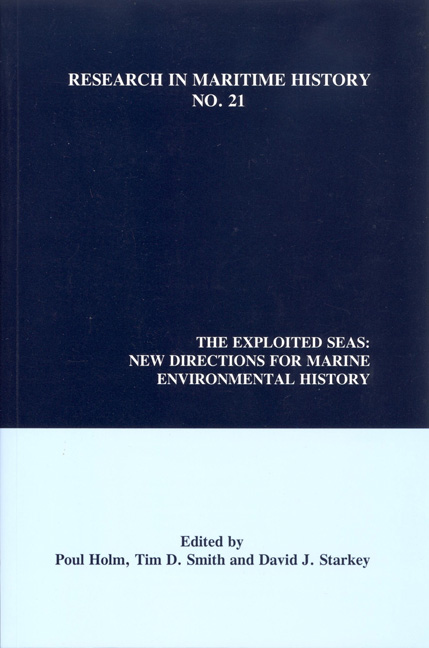Book contents
“Introduction”
Summary
The current condition of many of the marine animal populations affected both directly and indirectly by the harvesting activities of human societies has been established with some certitude by aquatic and marine ecologists. Much less attention, however, has been afforded to the state of harvested populations beyond comparatively recent times, chiefly because the interests of fisheries ecologists have tended to be contemporary in scope, with less regard paid to historical trends and precedents. Their investigations, moreover, have been dominated by equilibrium-based theories of the impacts of harvesting. The reference points have too frequently been the hypothesized equilibrium state, and too seldom the longterm dynamics of population changes. At the same time, scientific studies of fisheries have often been geared to the fisheries management needs of the day, and these often have narrow regional perspectives. In this context, fisheries historians have so far made little impression. Theirs is an underdeveloped field of enquiry. As a consequence, in comparison with other fields of human production, notably agriculture and manufacturing, there are few substantial overviews of fishing, and those that have been produced adopt a national, regional or port perspective that does not elucidate the problems pertaining to marine basins and oceans. A further deficiency lies in the reluctance of fisheries historians to consider the natural environment on which fishing effort is both dependent and has a considerable impact. Historians have therefore tended to neglect the development of marine animal populations (the history of nature itself) and often lack the tools and theories to account for the fluctuations in harvests that have occurred in commercial fisheries. Historical reference points are thus important in two respects: while they offer ecologists information about the factors controlling marine populations, they also provide evidence for those historians concerned with the significance that harvesting the oceans has held for many human societies.
This volume is conceived as an attempt to correct some of these deficiencies. In combining the approaches of maritime history and ecological science it contributes to the field of environmental history, which has emerged in recent years as a distinctive branch of historical enquiry. The key to this new area of study is the integrated analysis of ecosystems and human societies, in particular the place of mankind in the historical development of ecosystems.
- Type
- Chapter
- Information
- The Exploited SeasNew Directions for Marine Environmental History, pp. xiii - xxPublisher: Liverpool University PressPrint publication year: 2001

